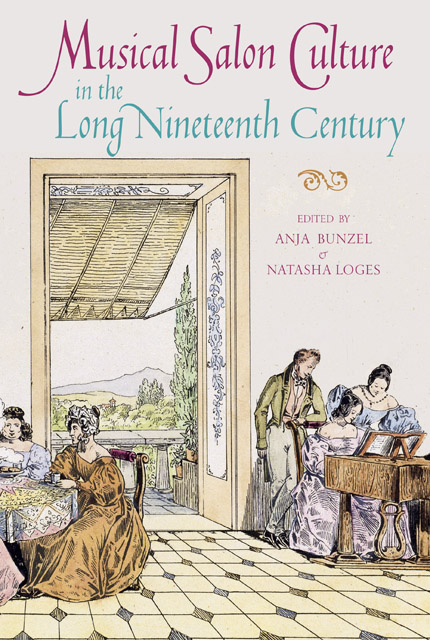13 - Josephine Lang and the Salon in Southern Germany
Published online by Cambridge University Press: 17 January 2023
Summary
Salons were of incalculable benefit to nineteenth-century women composers. There, they were able to become acquainted with a broad array of prominent musicians and with a broad spectrum of music. They were able to make contact with people who could contribute to the development of their compositional careers. They had the opportunity to be inspired by other musicians, including those of their own gender. Salons provided them with venues in which their works could be performed; such venues were, for most women composers, not easy to find. In this chapter, I focus on Josephine Lang (1815–80), one of the best-known female composers of her time, in order to point out the advantages (and occasional disadvantages) of her participation in the salons of southern Germany. With Lang, we shall visit the salons of three centres: Munich, Stuttgart and Tübingen.
Each of these locations was significant in Lang’s life. In Munich, her birthplace, she received the minimal musical education which was granted to her. There, during the 1830s, she experienced the first flowering of her compositional career, in the form of intense productivity and a significant amount of publication. In 1840, at a spa near Munich, she met the law professor and poet Christian Reinhold Köstlin (1813–56). She married him in 1842 and moved to Tübingen, where he taught at the university. Just before and during her marriage, she had the opportunity to visit nearby Stuttgart, but she spent the bulk of her life after 1842 in Tübingen.
It was in Munich that Lang’s first and most prolonged exposures to salons took place. Although it was already one of the larger cultural centres in Germany during the 1830s, Munich was not at that time a stronghold of salon activity. Various nineteenth-century writers provided possible reasons for the paucity of salons. Both the writer Otto Freiherr von Völderndorff and the theatre director and journalist Franz Dingelstedt stated that southern Germans were not comfortable with inviting people into their homes. The poet Felix Dahn, comparing salon culture in northern and southern Germany, pointed out that Munich residents’ preference for gathering at inns over beer, rather than in homes over tea, put a damper on the development of salons in that city.
- Type
- Chapter
- Information
- Musical Salon Culture in the Long Nineteenth Century , pp. 199 - 210Publisher: Boydell & BrewerPrint publication year: 2019

